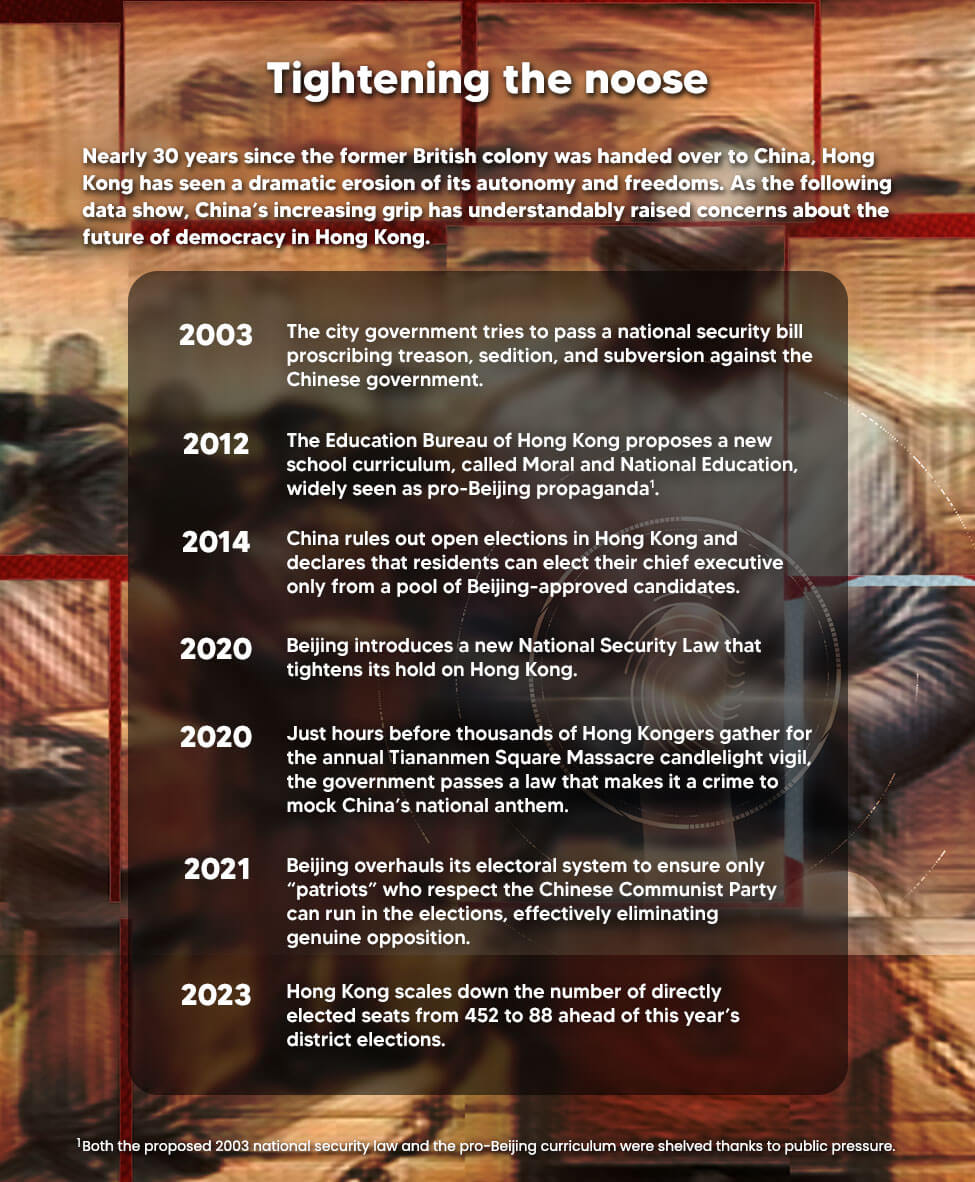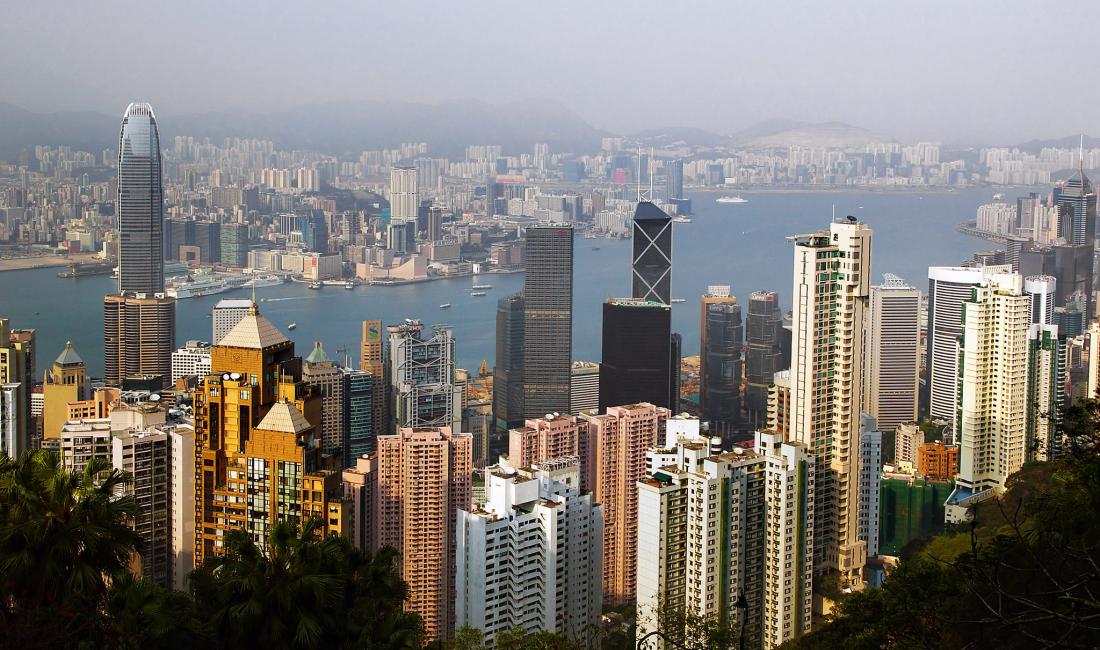More rules on district elections undermine democracy
By ANDREW SHUM
This story was originally published by Asia Democracy Chronicles, a partner of Democracy Local. Photo Credit: Bernard Spragg, NZ, via Flickr Public domain, Creative Commons license 1.0
Last September, Hong Kong’s largest opposition party was forced to cancel its annual banquet after being told the venue was closed due to the need to repair the windows damaged by a typhoon. The Democratic Party was probably disappointed it couldn’t push through with its event, but it wouldn’t have been really surprised. After all, it was hardly the first time the 29-year-old party had to shelve its banquet plan due to “unexpected circumstances.”
In July last year, the party’s booking was cancelled at the last minute by another restaurant, which claimed that it needed to close for cleaning due to nearby COVID-19 cases. Earlier this year, at least three different venues cancelled the party’s bookings, too, with two of these citing necessary emergency repairs.
These incidents underscore the ongoing challenges faced by opposition parties in Hong Kong even at the pettiest levels. Indeed, opposition groups in the city have encountered unparalleled suppression, especially in the last three years. And from the looks of it, they – and the rest of Hong Kongers – will face even more difficulties ahead.
Shortly after the introduction of the National Security Law in 2020, there had been some hope that China might relax its stringent measures and permit some degree of participation by pro-democracy groups within the political framework. The thinking then was that the law would give China’s leaders some sense of security and would therefore allow a situation akin to those in some authoritarian regimes where opposition parties maintain a presence in parliament.
This hope, however, has since been effectively dashed. In a span of a few years, the city’s semi-democratic electoral system has been transformed into one that distinctly reflects China’s version of democracy.
Hong Kong’s pro-democracy political groups have either dissolved under political pressure or been marginalized in this new political landscape. In the meantime, while Hong Kongers are still entitled to vote in elections, the weight of their ballots has been diminished to practically nothing. Voters in the city today cannot make any meaningful change through an election – and they know it. Nevertheless, authorities are trying to ensure that they will be able to get as many people as possible in voting precincts on Dec. 10, when the city holds district-council elections. But the Hong Kong government has also made it clear that it will not cease tightening its control over political rights in the city.
An ever-shrinking pool of candidates
A year after the National Security Law was set in place, the city’s Legislative Council (LegCo) elections underwent an overhaul, which entailed reducing the number of directly elected seats and implementing strict vetting processes. A government-led committee now determines whether candidates meet the legal requirements to “genuinely uphold the Basic Law and faithfully pledge allegiance to Hong Kong.” As a result, the LegCo has transformed into a “patriots-only” body, devoid of dissenting voices.
This shift is widely regarded as a significant regression in Hong Kong’s constitutional development. In its periodic review last year, the U.N. Human Rights Committee expressed concerns over the non-compliance of the special administrative region’s electoral system with Article 25 of the International Covenant on Civil and Political Rights, saying the system “has further deteriorated” since the electoral changes enforced in 2021. It thus urged Hong Kong to introduce universal suffrage, a promise outlined in the Basic Law, the city’s mini-constitution, and reform the electoral system in accordance with the Covenant.
The Hong Kong government did introduce more changes – but in a direction opposite of what the United Nations had apparently hoped for. Last July, LegCo approved the government’s proposal to drastically amend the district council election, reducing the number of directly elected seats from 452 to 88.
Moreover, 40 percent of the council members will now be appointed by the Chief Executive, and another 40 percent elected from among the members of the Area Committees, District Fire Safety Committees, and District Fight Crime Committees (collectively called the “Three Committees”), all of whom are appointed by Hong Kong’s director of home affairs. Consequently, only 20 percent of the members of each of the 18 district councils will be elected through direct public vote.
The new rules also set a steep barrier for election candidates. In addition to securing nominations from at least 50 voters, each district councilor aspirant now has to undergo a vetting process led by top government officials, and obtain at least nine nominations from the Three Committees.
Previously, securing nominations from just 10 voters sufficed for eligibility. But that was when Hong Kong’s district councils did not play a significant role in the political sector, since by tradition the councils had limited power.
Then came the Anti-Extradition Law Amendment Bill Movement in 2019, when hundreds of political neophytes and young politicians ran for district council seats, turning the local elections in that year into a de facto referendum reflecting public dissent against the government and support for intensifying social movements. Eventually, the 2019 vote recorded a historic 71 percent voter turnout, with the pro-democracy camp securing a landslide victory by winning 388 seats. This marked the emergence of these newly elected councilors as a rising force in Hong Kong’s democracy movement.
Such a backdrop elucidates China’s determination to overhaul the district council elections even though most pro-democracy councilors have either already been disqualified by the authorities or resigned in 2021 due to fear of political persecution. Under the prevailing motto of “patriots ruling Hong Kong” and the emphasis on national security, similar results like those in the 2019 polls simply cannot be tolerated by China. And so the Hong Kong government has imposed fresh rules that include those depriving people of the right to stand for election.
Complete control?
It remains difficult to rationalize why members of committees focused on community activities, crime prevention, and fire safety can enjoy the privilege of nominating candidates for district councilor. These government-appointed committee members remain largely unknown to the public. The authorities have listed only their names on official websites, providing no contact information. It was only after complaints from the Democratic Party that the authorities agreed to disclose their postal addresses, but continued to withhold phone numbers and email addresses.
What is clear, though, is that the new requirement for nominations from the Three Committees poses a significant obstacle for aspiring candidates. It was therefore not surprising that a ludicrous situation occurred during the nomination period this year.
Predictably, the Democratic Party, which planned to send six members to run in the elections, failed to get any nomination. What surprised several observers, however, was that some pro-Beijing parties were also denied from running in the election.
Michael Tien Puk-sun, leader of the pro-Beijing group Roundtable and a legislator who is usually seen as a moderate, said that his group’s aspirants originally got nominations from seven members of the committees. But three of them backed out after “notifying the chairmen of their relevant district committees,” he added. This wasn’t an isolated incident, as some other pro-Beijing parties were similarly barred from participating in the elections.
It appears that the district council polls have become a game among the pro-Beijing loyalists. The Hong Kong Free Press (HKFP) has noted that around 75 percent of the 171 candidates are Three Committees members.
These incidents suggest that the government’s overhaul of the district council election process aims not only to exclude pro-democracy parties from local councils. Authorities want to go further – to completely control the outcome of the elections and eliminate any chance of unforeseen results.
This level of poll manipulation is a clear deviation from international standards for fair elections. According to General Comment No. 25 by the U.N. Human Rights Committee, “the right of persons to stand for election should not be limited unreasonably by requiring candidates to be members of parties or of specific parties. If a candidate is required to have a minimum number of supporters for nomination, this requirement should be reasonable and not act as a barrier to candidacy.”
The radical changes to the district election system have also drawn criticism from other members of the international community. The European Union, in a statement, said the overhaul of the election system “raise(s) serious questions about the state of fundamental freedoms, democracy, and political pluralism in Hong Kong.”
By all indications, however, the district council elections will push through under the new rules imposed by the Hong Kong government. Yet while Hong Kong voters have essentially lost their right to elect their leaders, there are still ways for them to be heard, such as by not showing up at the precincts.
Hong Kong authorities are already aware of that possibility. In the 2021 LegCo election, the voter turnout was only 30.2 percent, an all-time low. And while Chief Executive John Lee has been encouraging people to cast their ballots, other officials have already taken to downplaying the significance of voter turnout, perhaps in anticipation of yet another low figure.
A recent HKFP report said that Secretary for Constitutional and Mainland Affairs Erick Tsang has cited the weather as a factor that may discourage people from voting. It also reported that Secretary for Home and Youth Affairs Alice Mak, in an interview with a Chinese-language newspaper, had said that people in a “stable society” may be less likely to vote.
Andrew Shum is a Hong Kong human rights activist based in the United Kingdom. He was Chief Executive of the Hong Kong Professional Teachers’ Union and cofounder of Civil Rights Observer. Both groups disbanded due to political pressure.




